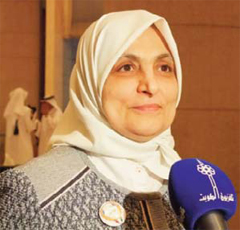KUWAIT: Minister of Social Affairs and Labor and Planning Hind Al-Subaih stressed that a draft will be ready by the beginning of the new year on a schedule needed to implement the Cabinet's instructions concerning adjusting Kuwait's demographic structure. Subaih added that a committee formed by the Cabinet had set 12 recommendations including linking expatriates' residency to their educational level and qualification, limiting the number of domestic laborers and increasing related fees once the limit is exceeded, with an exception to families that have disabled members, granting absconders a three-month grace period to legalize their statuses, increasing absconding fines, issuing strict laws against those who hire absconders and activating fingerprint scanners at various border exits to make sure deportees do not return to Kuwait after changing their passports.
Speaking at press conference on the sidelines of presiding the supreme demographic structure committee meeting with representatives from the planning and development secretariat general, the Census Central Department, Manpower and Government Restructuring Program (MGRP), Manpower Public Authority, Public Authority for Civil Information (PACI) and the ministries of commerce, health, interior and foreign affairs, Subaih said that some bodies had made their own suggestions and agreed to set a timetable to put the measures agreed in practice and determine bodies responsible for carrying them out during 2016.
Subaih added that possible effects of each of the measures agreed upon on the labor market would be studied and an indicator would be set to weigh cons and pros so that immediate, short term and long term actions could be made within a maximum of four years.
Subaih added that the recommendations included automating the procedures followed on bringing workers from abroad with the aim of fighting visa manipulations, imposing strict measures on workers working in jobs other than those they had been hired and brought to Kuwait to do, mandating contractors to repatriate workers after concluding projects, encouraging citizens to take part in production and vocational businesses, encouraging youth to start small and medium projects, automating the process of assessing companies' need of labor and setting restrictions on dependent and family visit visas. - Al-Rai




